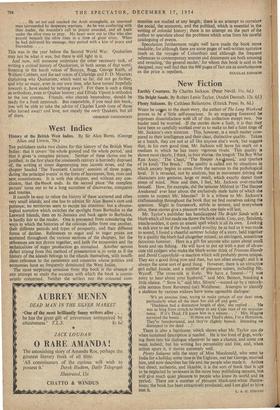West Indies
History of the British West Indies. By Sir Alan Burns. (George Allen and Unwin. 70s.) THE publishers make two claims for this history of the British West Indies: that it covers the whole ground and the whole period,' and that it gives 'a complete picture.' Neither of these claims can be justified; in the first place the nineteenth century is hurriedly disposed of, the writing at times degenerating into laconic notes, and the chapter headed 'The Twentieth Century' consists of three pages, dating the principal events' in the form of hurricanes, fires, riots and new constitutions. It is with this chapter, and without any con- clusion, that the tbook ends. In the second place 'the complete picture' turns out to be a long narration of discoveries, conquests and treaties.
It cannot be easy to relate the history of these scattered and often very small islands, and one has to admire Sir Alan Burns's care and patience; no territories seem to escape his attention : but a chrono- logical narrative which switches the spotlight from Barbados to the Leeward Islands, then on to.Jamaica and back again to Barbados, is hardly fair to the reader. One is prevented from considering the ways in which the histories of the colonies differ from one another, their different periods and types of prosperity, and their different forms of decline. References to sugar and to sugar prices are scattered throughout the various sections of the chapters, but the references are not drawn together, and both the economics and the technicalities of sugar production go unstudied. Another serious defect arising from this method of presentation is to write as if the history of the islands belongs to the islands themselves, with insuffi- cient reference to the continents and countries whose politics and economies have so frequently dominated the West Indies.
The most surprising omission from this book is the absence of any attempt to study the societies with which the book is contin- uously concerned. Neither the settlers nor the coloured corn- munities are studied at any length; there is no attempt to correlate the social, the economic, and the political, which is essential in the writing of colonial history; there is no attempt on the part of the author to speculate about the problems which arise from his careful cataloguing of events.
Speculation furthermore might well have made the book more readable; for although there are some pages of well-written narrative (such as the voyages of Columbus) and although the frequent references to contemporary sources and documents are both amusing and revealing, 'the general reader,' for whom this book is said to be designed, may well find that the 800 pages of fact are as unwholesome


































 Previous page
Previous page